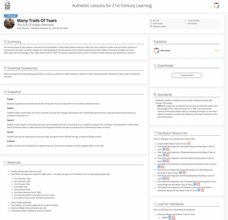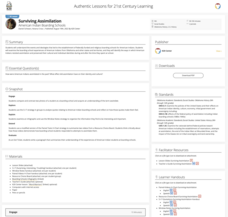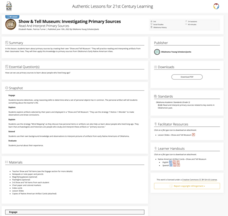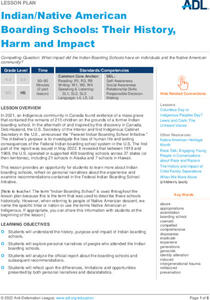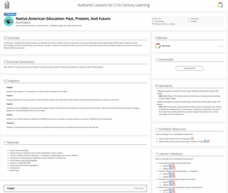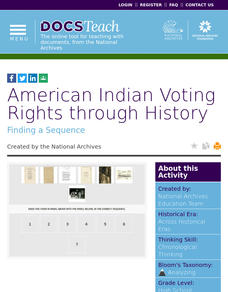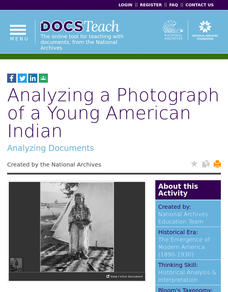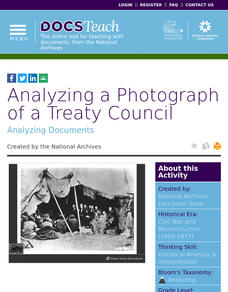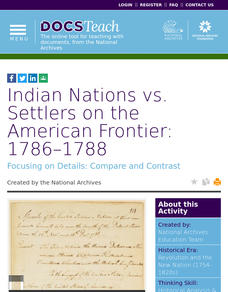K20 LEARN
Many Trails of Tears: The Era of Indian Removal
Cherokee, Chickasaw, Choctaw, Creek, and Seminole. All were forced off their ancestral lands in the southeastern United States as part of the Indian Removal Act of 1830. Young historians research the tribes' reactions to this removal and...
K20 LEARN
Tribal Sovereignty and the Indian Reorganization Act: Tribal Governments
Sovereign nations or wards? High schoolers investigate the history of the Indian Reorganization Act and other legislation that impacted Native Americans. They also research different tribes' constitutions, compare them to the U.S....
K20 LEARN
Surviving Assimilation: American Indian Boarding Schools
The boarding school era is "a history that all of us need to know about," says Secretary of the Interior Deb Haaland. Here's a lesson plan that examines that history. High schoolers examine video interviews of Native Americans who detail...
K20 LEARN
How Did We Get Here? Native Americans in the United States
High schoolers imagine what their lives would be like if they had no access to potable water and watch a morning news show about the water situation on a Navajo reservation. Groups investigate the policies that lead to the lack of water...
Curated OER
Trickster Tale Comics: The Cunning Coyote
The trickster tale "The Coyote Places the Stars" tells how a coyote is sneaky but helpful. After listening to the tale, scholars use their imagination to create a trickster tale about a coyote, displaying their journey through a comic...
Curated OER
Navajo Weaving: A Lesson in Math and Tradition
Combine geometry and tradition with a lesson that spotlights Navajo weaving. The book, The Goat in the Rug by Charles L. Blood and Martin Link hooks scholars before watching a video of Navajo people tending their sheep and beginning to...
K20 LEARN
Show and Tell Museum - Investigating Primary Sources: Read and Interpret Primary Sources
Scholars become detectives in a instructional activity that focuses on primary sources. Learners practice their observational skills by examining the teacher's artifact and visiting the Show and Tell Museum that highlihgts items from...
Anti-Defamation League
Indian/Native American Boarding Schools: Their History, Harm and Impact
Encultureate, assimilate, or eliminate? The 2021 discovery of a mass grave of over 200 children on the site of a former Canadian Indian Boarding school led to the creation of the Federal Indian Boarding School Initiative. High schoolers...
K20 LEARN
Native American Education - Past, Present, and Future: Assimilation
To understand the history of Native American education, high schoolers examine the record of young scholars who attended the Carlisle Indian School from 1879-1918. They also examine sources that contain information about indigenous...
DocsTeach
American Indian Voting Rights through History
Vote ... it's your right! An enlightening lesson examines the history of voting rights for Native Americans. Leaners analyze primary documents and place them in chronological order. Academics also create a list of other events that took...
DocsTeach
Analyzing a Letter About American Indian Voting Rights
An informative activity focuses on the law preventing Native Americans from voting until 1947. Scholars read documents from the Office of Indian Affairs, complete an online worksheet, and participate in group discussion. Academics learn...
Center for History Education
Breaking the Great League of Peace and Power: The Six Iroquois Nations During and After the American Revolution
What happens when you can't remain neutral? An informative lesson explores the impact of the American Revolution on the Iroquois Nations. Scholars learn about the six Iroquois nations and their treaty with the newly formed American...
Smithsonian Institution
Native Resistance: Native Resistance Then and Now
Native Americans lost so much—and gained so little in return. Scholars explore Native Americans' resistance to the United States government. The lesson plan uses primary sources to explore the different forms of protest and gives a voice...
DocsTeach
Assimilation of American Indians
Imagine being forced to give up your culture and then being graded on how well you complied with orders to do so. Documents show young historians the price indigenous peoples paid as a result of the Dawes Act, which was essentially a...
DocsTeach
Assimilation and the Native People of Metlakahtla, Alaska
Fitting in to a dominant culture comes at a price—especially for native peoples. Class members consider this concept using a photo matching game of indigenous people in Alaska. Discussion questions help them consider to what extent these...
DocsTeach
Analyzing a Photograph of a Young American Indian
A true glimpse of the past, Angelic La Moose smiles back from more than 100 years ago. Young learners examine the picture of a young girl on a Montana Native American reservation from 1913 to comb it for historical details. A form, which...
National Woman's History Museum
Red Power Prevails : The Activism, Spirit, and Resistance of Native American Women
Native American women powered the American Indian Movement and other social changes, but they are often forgotten by history books. Examining a series of resources, including a documentary film, photographs, secondary sources, and social...
DocsTeach
Evaluating Perspectives on Westward Expansion
Although popular culture tells the story of the American West simplistically, its reality is far more complex. Native American tribes—while already on the land—didn't have the same interests, and conflicts between white settlers and...
DocsTeach
Analyzing a Photograph of a Treaty Council
A photo catches a moment in time that provides a glimpse into the past. An interesting resource focuses on historical analysis using an image from a treaty council with Native Americans. Budding historians complete an online worksheet...
DocsTeach
Lewis and Clark's Expedition to the Complex West
Lewis and Clark's famous expedition is a prime example of the United States' westward expansion. Aspiring historians examine maps from Lewis and Clark's journey, as well as discuss their interactions with Native American tribes. The...
DocsTeach
Indian Nations vs. Settlers on the American Frontier: 1786–1788
Once Americans won the Revolutionary War, their quest to gain land did not end. An interesting activity focuses on Americans' expansion into the frontier following the war and how it conflicted with Native Americans living in the area....
National Endowment for the Humanities
Hopi Poetry
The Hopi refer to corn as their children, demonstrating its importance to the Native American group. Class members consider the role of literal and figurative language by examining poetry from this indigenous group. The resource includes...
Scholastic
The First Thanksgiving Feast for Grades 6–8
It's time for the feast! Young historians complete their study of the First Thanksgiving by completing an online activity, watching a slideshow, and examining a First Thanksgiving timeline. After answering text-dependent questions to...
Teaching Tolerance
Thanksgiving Mourning
Two primary sources, a speech, and an article provide tweens and teens with different perspectives of the American Thanksgiving holiday. After analyzing Wamsutta James' suppressed speech and Jacqueline Keeler's article, class members use...


